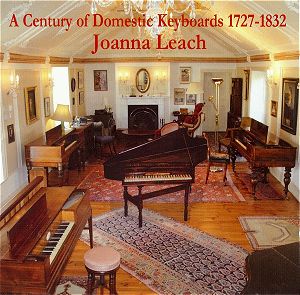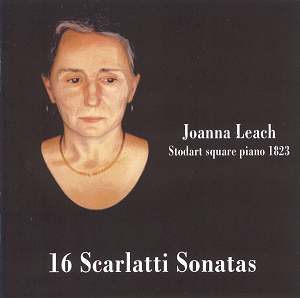 |
 |
|


alternatively
CD: AmazonUK
AmazonUS
|
A Century of Domestic Keyboards
François COUPERIN (1668-1733)
6e Ordre in B flat: Les Baricades Mystérieuses* [2:46]
13e Ordre in b minor: Les folies Françaises, ou les Dominos*
[9:02]
William BYRD (1543-1623)
Pavan The Earle of Salisbury* [1:17]
George Frideric HANDEL (1685 - 1759)
Fantasia in C (HWV 490)* [3:32]
Sonata in g minor (HWV 580) [2:33]
Toccata in g minor (HWV 586) [1:10]
Johann Sebastian BACH (1685 - 1750)
Prelude in E (BWV 937) [1:47]
Prelude in e minor (BWV 938) [1:52]
George Frideric HANDEL
Air and variations (HWV 578,1) [4:09]
Antonio SOLER (1729-1783)
Sonata in D (R 84) [3:15]
Wolfgang Amadeus MOZART (1756-1791)
Adagio in b minor (KV 540) [8:47]
Franz Peter SCHUBERT (1798-1828)
Walzer in b minor (D 145 No. 6) [1:19]
Walzer in B (D 365 No. 24) [0:43]
Ecossaise No 1 (D 783 No. 17) [0:20]
Deutscher Tanz in G (D 783 No. 4) [0:38]
Ländler (D 790 No. 4) [0:46]
Valse sentimentale in A (D 779 No. 13) [1:16]
Ungarische Melodie in b minor (D 817) [3:41]
Felix MENDELSSOHN-BARTHOLDY (1809-1847)
Venetianisches Gondellied in f sharp minor, op. 30 No 6 [3:10]
Venetianisches Gondellied in a minor, op. 62 No 5 [3:19]
Wie die Zeit läuft! [2:27]
Duetto in A flat, op. 38 No 6 [3:25]
Albumblatt in e minor, op. 117 [4:54]
 Joanna Leach (spinet*, square pianos)
Joanna Leach (spinet*, square pianos)
rec. 1999, Felden Street, Fulham, London; 2007/08, Music Room, Shute
House, Axminster. UK. DDD
 ATHENE RECORDS ATH23026 [66:21]
ATHENE RECORDS ATH23026 [66:21] 
|


alternatively
CD: AmazonUK AmazonUS
Download: Classicsonline |
Domenico SCARLATTI (1685
- 1757)
16 Keyboard Sonatas
Sonata in b minor (K 27) [3:51]
Sonata in f minor (K 466) [5:42]
Sonata in C (K 461) [4:31]
Sonata in d minor (K 1) [3:03]
Sonata in a minor (K 54) [4:59]
Sonata in A (K 113) [4:21]
Sonata in f minor (K 481) [7:31]
Sonata in e minor (K 198) [3:29]
Sonata in A (K 208) [4:02]
Sonata in A (K 209) [4:46]
Sonata in D (K 491) [5:35]
Sonata in D (K 492) [4:43]
Sonata in d minor (K 64) [2:13]
Sonata in f sharp minor (K 25) [4:44]
Sonata in d minor (K 9) [3:34]
Sonata in E (K 380) [5:24]
 Joanna
Leach (square piano) Joanna
Leach (square piano)
rec. December 1997, July 1999, Felden Street, Fulham, London; June 2001, February
2006, Music Room, Shute House, Axminster. UK. DDD
 ATHENE
RECORDS 23025 [72:27] ATHENE
RECORDS 23025 [72:27]  |
|
|
Joanna Leach is a pianist who has made a career as a soloist and
chamber musician playing the modern concert grand. When she inherited
a historical square piano she decided to have it restored. It
was only by playing the instrument in its restored state that
she discovered how much a historical instrument can tell about
the character of the music written for it. And gradually she devoted
her time to playing square pianos. The booklets of both discs
contain an impressive list of recordings with music from Haydn
to Chopin.
The first disc to be reviewed here is an exception in that it
contains older repertoire than she normally performs. Both discs
show that Joanna Leach is an excellent artist, and for someone
who usually plays much later music her performance of works from
the late renaissance and the baroque is pretty good.
These discs are particularly interesting because they present
four instruments which were mainly used for domestic music-making,
and therefore hardly ever deployed in public concerts. As music-making
at private homes became increasingly important in the 18th century
this aspect of music history cannot be ignored. In particular
in the early 19th century some music was specifically composed
to be played at home, and therefore would probably fare better
on a square piano than on the 'normal' fortepiano,
let alone a modern concert grand.
These discs nevertheless raise some questions about the repertoire
chosen to present these instruments.
Let us look first at the disc called 'A Century of Domestic
Keyboards 1727-1832'. These dates refer to the years the
instruments were built.
Joanna Leach starts the programme on a spinet which was built
in 1727 by Thomas Barton. The spinet is a small-size harpsichord
with one manual and a single set of strings and jacks. Although
various forms of the term 'spinet' are used in Italy,
France, Germany and the Netherlands, they are not always used
for the same kind of instruments. This makes it difficult to determine
how widespread the use of an instrument like the one played here
was in the various countries in Europe. Very few instruments from
Italy and even fewer from France and Germany have been preserved.
Can this be an indication of their dissemination?
It seems that the spinet was especially popular in England. From
that perspective, and considering the instrument used here it
would have more logical to choose English repertoire than pieces
by François Couperin. If it was Ms Leach's aim to show
what kind of music people played at home on their spinets I consider
her attempt not quite convincing. Was Couperin's music
performed in England and is it plausible to think his music was
played on the spinet, an instrument probably mostly used by amateurs?
The choice of Handel is much more logical, and I would have liked
Ms Leach to play more of his music, in particular as Handel's
keyboard music (with the exception of the eight suites of 1720)
isn’t all that well-known.
Some more of his music appears in the next section in which Joanna
Leach plays a square piano, built in 1787 by Longman and Broderip.
This kind of instrument also was very popular in England. In his
programme notes Andrew Lancaster states that the square piano
was probably invented in 1763 by Johannes Zumpe in London. "Within
a few years, London was experiencing a veritable square-piano
fever. Many musical instrument makers, and, one suspects, cabinet
makers too, leapt onto this most lucrative bandwagon and began
to manufacture square pianos."
On this instrument Ms Leach plays not only Handel but also Johann
Sebastian Bach. The performance of compositions which were originally
conceived for the harpsichord, is justified thus: "Performers
of the time would of course continue to play the repertoire which
was familiar to them, all their old favourites transformed by
the use of dynamics and sustained notes." This seems valid
in the case of Handel, even though the instrument doesn't
suit his music very well. In particular the trills are rather
unnatural on an instrument reflecting a different aesthetic ideal.
Bach's music does sound better, but its inclusion in the
programme is rather curious. It was not until the 1790s that some
of his keyboard works began to circulate in England, but only
in manuscript. Some of his music was published in the first decades
of the 19th century. Even if players of the square piano had access
to Bach's keyboard works before the turn of the century
- and that is a big 'if' - it seems not likely that
the Little Preludes were among them as they were written as teaching
material, like the Clavierbüchlein for Wilhelm Friedemann
Bach.
The third instrument is another square piano, built by Stodart
in 1823. Here we hear music by Soler, Mozart and Schubert. Again,
the question is whether this kind of repertoire was played in
England. Soler seems a strange choice, but some of his sonatas
were published in London around 1796. This particular sonata doesn't
fare very well on this square piano, especially because of the
percussionistic effects. Schubert's dances are a much less
convincing choice; some of them were only published in the late
19th century. And I understand that Schubert wasn't performed
in Britain until the second half of the 19th century anyway. Such
historical considerations apart, Schubert's German dances
are exactly the kind of music for which the square piano is most
suitable.
Felix Mendelssohn-Bartholdy is a wholly different story. He was
in England and became very famous. Whether his piano music was
known and played I don't know but the performance on a
Clementi square piano of 1832 seems more plausible than playing
Schubert on the Stodart.
For the second disc we return to the latter instrument. Here Joanna
Leach plays a selection from the large corpus of keyboard sonatas
of Domenico Scarlatti. Many pianists play his sonatas on the concert
grand, which is historically unfounded and musically unsatisfying.
Although the Stodart is historically closer to Scarlatti than
a concert grand the performance is not more satisfying. It is
true that at the Spanish court where Scarlatti was working the
fortepiano was known, but it was very different from this square
piano. And although one can't exclude the possibility that
Scarlatti played the fortepiano, his music fare poorly on it,
as other recordings on 18th-century fortepianos show.
Still, the performance on this instrument could possibly be justified
with the argument quoted before: Scarlatti's keyboard sonatas
were known and very popular in England, and it is possible that
they were still played when the time of the harpsichord had long
gone. As with the first disc Joanna Leach plays the sonatas very
well, but even so the real character of Scarlatti's keyboard
music hardly comes out on this instrument.
I don't want to sound too negative about these discs. Not
everyone makes as much fuss about the historical connection between
instrument and repertoire as I do. Even though I would have liked
Ms Leach to be a little more critical in her choice of music,
the instruments presented here are very interesting and not easily
available on disc. They shed light on a virtually ignored aspect
of music-making in the 18th and 19th centuries. And the repertoire
played here - in particular Schubert and Mendelssohn - isn't
played and recorded often because it doesn't go well on
modern pianos; not even on the 'large' fortepiano.
It is to be hoped that discs like these will encourage keyboard
players to explore the world of domestic music-making and matching
appropriate music and to appropriate instruments.
Johan van Veen
|
|
|












